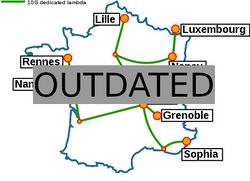Grid5000:Home
|
Grid'5000 is a large-scale and versatile testbed for experiment-driven research in all areas of computer science, with a focus on parallel and distributed computing including Cloud, HPC and Big Data. Key features:
Older documents:
|
Random pick of publications
Five random publications that benefited from Grid'5000 (at least 2937 overall):
- Rémi Meunier, Thomas Carle, Thierry Monteil. Multi-core interference over-estimation reduction by static scheduling of multi-phase tasks. Real-Time Systems, 2024, pp.1--39. 10.1007/s11241-024-09427-3. hal-04689317 view on HAL pdf
- Berné Nortier, Mostafa Sadeghi, Romain Serizel. Unsupervised speech enhancement with diffusion-based generative models. International Conference on Acoustics Speech and Signal Processing (ICASSP), IEEE, Apr 2024, Seoul (Korea), South Korea. 10.48550/arXiv.2309.10450. hal-04210707v2 view on HAL pdf
- Mostafa Sadeghi, Romain Serizel. Posterior sampling algorithms for unsupervised speech enhancement with recurrent variational autoencoder. International Conference on Acoustics Speech and Signal Processing (ICASSP), IEEE, Apr 2024, Seoul (Korea), South Korea. 10.48550/arXiv.2309.10439. hal-04210679v2 view on HAL pdf
- Guillaume Schreiner, Pierre Neyron. SLICES-FR : l’infrastructure de recherche nationale pour l’expérimentation Cloud et Réseaux du futur. JRES 2024 - Journées réseaux de l'enseignement et de la recherche, Renater, Dec 2024, Rennes, France. pp.1-15. hal-04893845 view on HAL pdf
- Yarin Oziel, Tomer Laor, Shlomi Levy, Clémentine Maurice, Yossi Oren, et al.. WIP: A Second Look at Port Assignment on Intel CPUs. uASC 2026 - 2nd Microarchitecture Security Conference, Feb 2026, Leuven, Belgium. hal-05337434 view on HAL pdf
Latest news
Failed to load RSS feed from https://www.grid5000.fr/mediawiki/index.php?title=News&action=feed&feed=atom: Error parsing XML for RSS
Grid'5000 sites
Current funding
As from June 2008, Inria is the main contributor to Grid'5000 funding.
INRIA |
CNRS |
UniversitiesUniversité Grenoble Alpes, Grenoble INP |
Regional councilsAquitaine |


